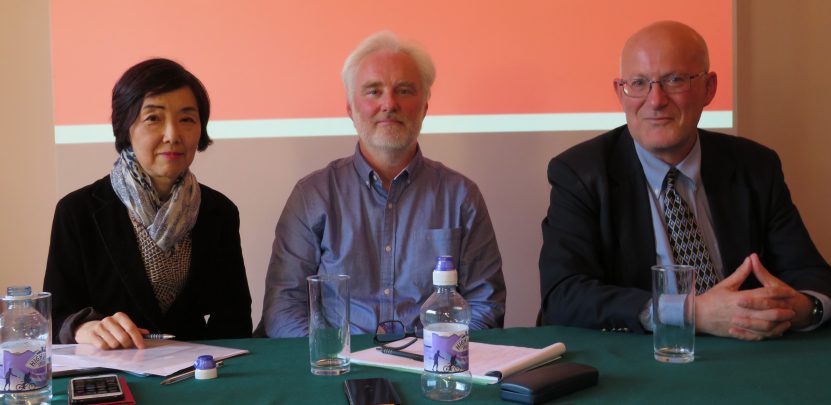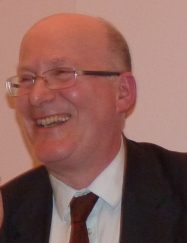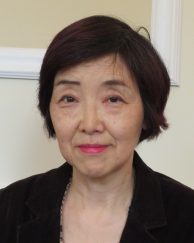 セミナーシリーズ 2017
セミナーシリーズ 2017Friday 12 May 2017
6:00pm – 8:00pm
A History of Journalism: then, now and hereafter
13/14 Cornwall Terrace, Outer Circle (entrance facing Regent's Park), London NW1 4QP
大和日英基金 主催
The second seminar in our Annual Seminar Series focuses on the history of journalism. In the era of digital news, social media and the arrival of the concepts of ‘fake news’ and ‘alternative facts’, is mainstream journalism facing insurmountable challenges? What can today’s journalists learn from the past?
Throughout history, powerful authorities have put pressure on the media to espouse certain doctrines or convey specific information. During the Second World War, Japanese newspapers acted as a mouthpiece of the Imperial government, whipping up militaristic fervour through patriotic columns and cartoons. In January 2016, hard-hitting NHK journalist Hiroko Kuniya was ousted from news analysis programme ‘Close-up Gendai’ following alleged pressure from the Abe Administration. In the UK, media barons from Lord Rothermere in the early 20th Century to Rupert Murdoch in the early 21st Century have been some of the most powerful figures in modern British history, being courted by politicians and even Prime Ministers to ensure their newspapers’ support. Professor Jeremy Black discusses the history of newspapers and the media and consider the role they may or may not hold in influencing the world today.
In his book On Liberty (1859) John Stuart Mill famously justified the articulation of even ‘false’ opinions on the basis that these opinions, if freely aired in the marketplace of ideas, will be subject to scrutiny, exposed as false and thus rejected by society at large. The notion that bad ideas should be tested in open debate has proved resilient as a basis for freedom of speech and freedom of the press. Dr John Steel examines this principle as a foundation for freedom of speech in the light of developments in journalism and politics – particularly the advent of the so-called ‘post-truth’ era in which ‘fake news’ and ‘alternative facts’ have become part of public and political discourse.
A written summary of the three presentations can be found via the button below:
Written Summary, PDF
コントリビューターについて

Professor Jeremy Black MBE
Professor Jeremy Black MBE is an historian and Professor of History at the University of Exeter. He is a senior fellow at the Centre for the Study of America and the West at the Foreign Policy Research Institute. He is the author of over ninety books, especially on eighteenth century British politics and international relations, and is a major exponent of military, diplomatic and cartographic history. He has been important in helping the British to look at their past, as well as in representing British history to foreign audiences. His latest book is called The Power of Knowledge: How Information and Technology Made the Modern World, which focuses on the relationship between information and society, and demonstrating how the understanding and use of information have been the primary factors in the development and character of the modern age.

Dr John Steel
Dr John Steel is a Lecturer in Journalism Studies at the University of Sheffield. After spending a number of years in the print industry as a graphic designer and originator, John decided to study for a degree in politics at the University of Sheffield. Following his undergraduate degree John went on to study for a PhD in political theory. His PhD focused on freedom of speech and its ideological components in early to mid-nineteenth century radical newspapers and pamphlets. Following stints teaching politics at both Sheffield Hallam University and the University of Sheffield, John was appointed as lecturer in Journalism Studies at the University of Sheffield in February 2005.

Ginko Kobayashi
Ginko Kobayashi is a London-based Japanese freelance journalist. After graduating from Seijo University, Tokyo, Kobayashi first worked in financial institutions and moved on to journalism in early 1990s as a reporter/business editor at the English language edition of The Daily Yomiuri (nowThe Japan News) until 2002. She now writes for various Japanese media outlets about journalism and politics. Kobayashi’s books include The Power of the Financial Times (Yosensha, 2016) and A History of the British Media (Chuo Koronshinsha, 2011). She also co-translated Boris Johnson’s book Churchill Factor (President, 2016).